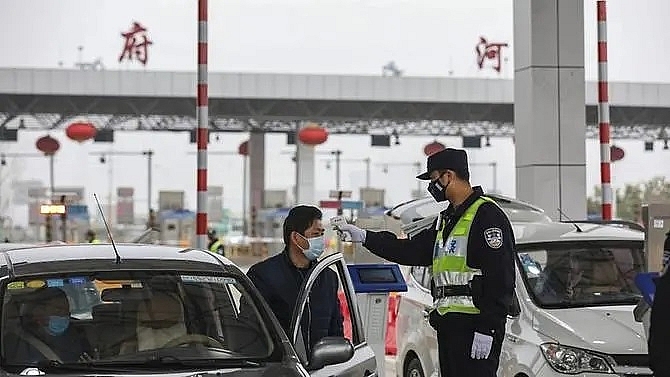Wuhan virus death toll hits 42 as cases soar to nearly 1,300 in China
 |
| A police officer checks the temperature of a driver at a highway in Wuhan, in China's central Hubei province, on Jan 24, 2020. (Photo: AFP) |
The 15 new deaths all took place in Wuhan, the city of 11 million where the deadly respiratory contagion first emerged, the Hubei Health Commission said.
At least 444 new cases of the virus have been found, raising the total number to 1,287, the National Health Commission said in a separate statement.
The disease has spread to 30 provinces, autonomous regions and municipalities.
Wuhan and 13 other cities in Hubei have been locked down in an unprecedented quarantine effort aimed at containing the deadly respiratory contagion, which has spread to several other countries.
The Hubei Health Commission also reported 180 new cases overall in the province, 77 of them in Wuhan but the bulk of the rest spread out across the locked-down smaller cities. There are now 729 cases in Hubei alone.
Chinese state media also announced the death of a doctor who worked at the front line of the outbreak at a hospital in Hubei.
Several of those cities were reporting their first cases of the pathogen - 2019 Novel Coronavirus (2019-nCoV) - the commission said.
The newly identified coronavirus has created alarm because there are still many unknowns surrounding it such as how dangerous it is and how easily it spreads between people. It can cause pneumonia, which has been deadly in some cases.
Symptoms include fever, difficulty breathing and coughing. Most of the fatalities have been in elderly patients, many with pre-existing conditions, the WHO said.
It has caused global concern because of its similarity to SARS (Severe Acute Respiratory Syndrome), which killed hundreds across mainland China and Hong Kong in 2002-2003.
China on Friday imposed transport bans in an area covering a staggering 41 million people, as the United States confirmed its second case of the SARS-like virus that has reached almost a dozen countries.
The World Health Organization said China faced a national emergency but stopped short of declaring a global health emergency, which would have prompted greater global cooperation.
The outbreak emerged in late December in Wuhan, an industrial and transport hub of 11 million people in China's centre, spreading to several other countries.
China is in the midst of its Chinese New Year holiday, a typically joyous time of family gatherings and public festivities.
But on Friday Wuhan was a ghost town, its streets deserted and stores shuttered.
As Wuhan slides into isolation, pharmacies have begun to run out of supplies and hospitals have been flooded with nervous residents. The city is rushing to build a 1,000-bed hospital by Monday, state media said.
"It must be confusing and infuriating that on the weekend the government reassured citizens that the virus did not spread between humans and was under control, and then, only four days later, to initiate an unprecedented lockdown of Wuhan and other cities," said Mary Gallagher, director of the Lieberthal-Rogel Center for Chinese Studies at the University of Michigan.
Airports around the world have stepped up screening of passengers from China, though some health officials and experts have questioned the effectiveness of such screenings and of the lockdown.
What the stars mean:
★ Poor ★ ★ Promising ★★★ Good ★★★★ Very good ★★★★★ Exceptional
 Tag:
Tag:
Related Contents
Latest News
More News
- Foreign leaders extend congratulations to Party General Secretary To Lam (January 25, 2026 | 10:01)
- Russian President congratulates Vietnamese Party leader during phone talks (January 25, 2026 | 09:58)
- Worldwide congratulations underscore confidence in Vietnam’s 14th Party Congress (January 23, 2026 | 09:02)
- Political parties, organisations, int’l friends send congratulations to 14th National Party Congress (January 22, 2026 | 09:33)
- 14th National Party Congress: Japanese media highlight Vietnam’s growth targets (January 21, 2026 | 09:46)
- 14th National Party Congress: Driving force for Vietnam to continue renewal, innovation, breakthroughs (January 21, 2026 | 09:42)
- Vietnam remains spiritual support for progressive forces: Colombian party leader (January 21, 2026 | 08:00)
- Int'l media provides large coverage of 14th National Party Congress's first working day (January 20, 2026 | 09:09)
- Vietnamese firms win top honours at ASEAN Digital Awards (January 16, 2026 | 16:45)
- ASEAN Digital Ministers' Meeting opens in Hanoi (January 15, 2026 | 15:33)






















 Mobile Version
Mobile Version